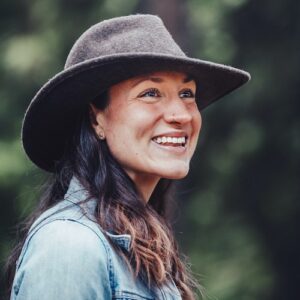Board of Directors Profile: Deb Hatcher
Where are you from?
I’m from Detroit. You’ll hear people say that, but I’m really from Detroit. My dad was the appraiser for Tiger Stadium, Cobo Hall and such. If you worked for the city, you lived in the city, not the suburbs.
Is owning a winery what you always wanted to do?
I’ve never been a great long-term planner and didn’t think about career much. I founded a high school humanities program and a college chamber orchestra, built an elementary school art/science program and coached high school basketball after Title IX. I think I just wanted to save the world. I was an idealistic baby boomer.
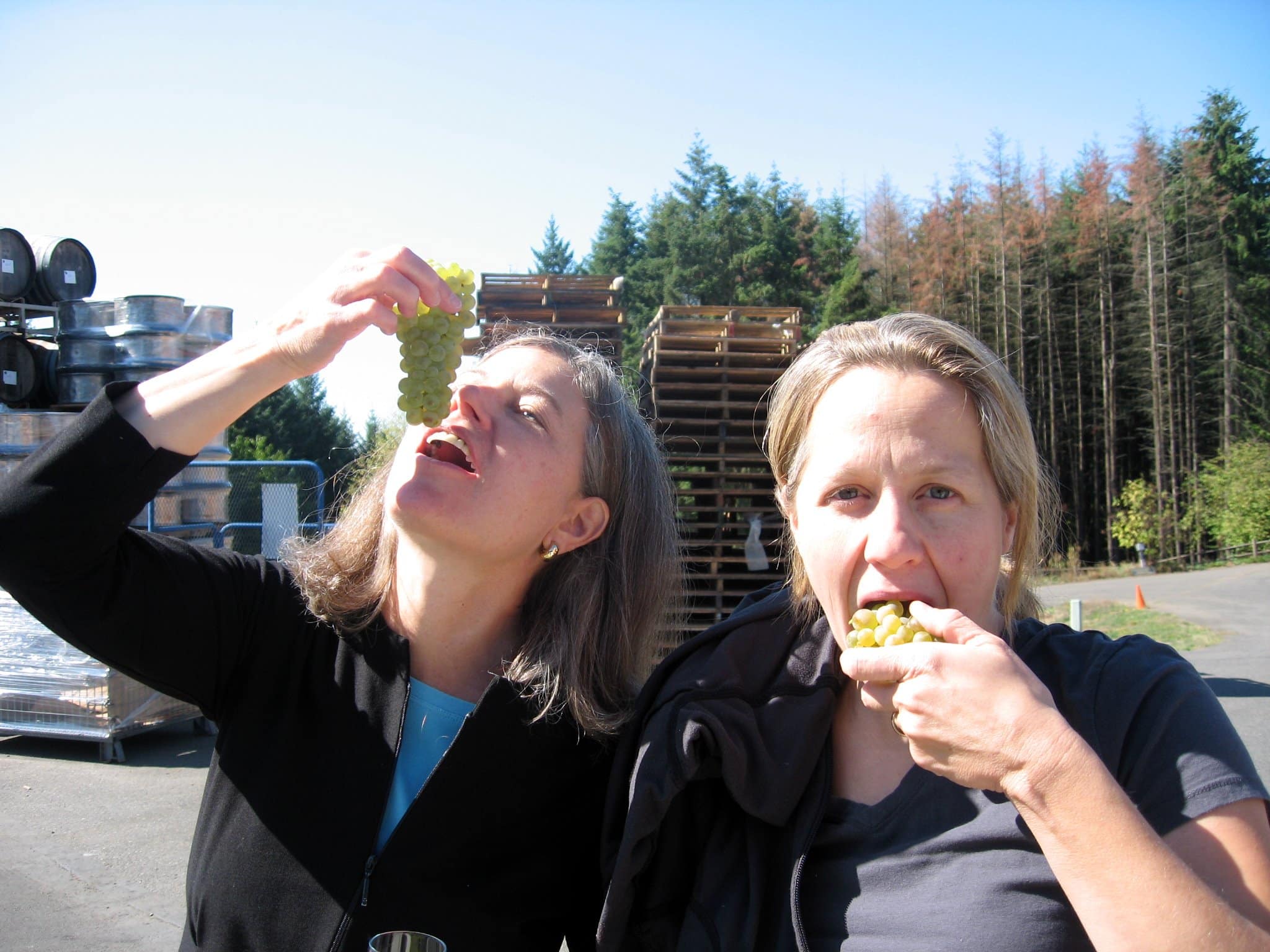
Deb (left) grape tasting at the vineyard
Note: Title IX is a federal civil rights law passed in 1972. “No person in the United States shall, on the basis of sex, be excluded from participation in, be denied the benefits of, or be subjected to discrimination under any education program or activity receiving Federal financial assistance.”
How did you get involved with The Freshwater Trust?
I went to the early Oregon Trout auctions and my daughter worked with the organization for a semester. It has been interesting to watch the transition from saving fish to protecting water and, now, to including people in this mission as well. The Freshwater Trust has always had a broad vision that’s impressive. It would be nice if all sectors could have this breadth.
What has been challenging and rewarding about serving on The Freshwater Trust’s board?
I was not initially clear about all of the work done by TFT and it took me a bit of time to get up to speed. It’s an interesting combination of big picture vision and expertise in a number of areas. There are scientists doing specific work and many people who have to be on the ground. It requires precision and patience.
Where I try to help most as a board member is through raising awareness. Whether that’s getting Joe a big speaking engagement or bringing winemakers together to have Joe talk more casually about TFT. I want to expand understanding of and support for this important work.
What are some other philanthropic issues you’re interested in?
There’s just so much need now for everything, including the creative arts. I think they are often the first to disappear and can be overlooked and underrated. It seems that if you give people a way to communicate, having that voice can help them cope with aspects of their lives that they may be struggling with.
What advice would you give to a younger person looking to serve on a board?
Choose organizations that you can passionately support in every way. If that passion isn’t there, find a different area where you do feel that. Board work takes study and commitment. Without that passionate feeling, it’s hard to commit to the work to become a productive board member.
What’s your favorite part about living in Oregon?
Every day, I think how lucky we are to live here. I learned to ski on a landfill in Detroit. To be within two hours of mountains or the ocean and having everything be so green is incredible.
How do you connect to rivers?
Mostly, I watch them and read about them. I’ve spent a fair amount of time on the North and South Umpqua, often reading. I’m excited about an upcoming trip down the Salmon River.
How do you feel about the way that women are treated today?
I’m glad to see the national debate now and hope it has traction. Mostly, I’ve never seen these topics as “women’s issues,” but rather, more broadly, as issues of fairness and justice for everyone who is suppressed and oppressed.
How does A to Z address issues of access and equity?
Oh, a lot of ways. We pay everyone in our company more than the average living wage and provide volunteer time off. We pay for education and 100% of health care benefit premiums.
We’ve sent a number of people to work in New Zealand – one of whom had never been on a plane and another who had never been out of Oregon. Women make up half of our company and our management. We’re always striving to do better and our B Corp certification measures that we do just that.
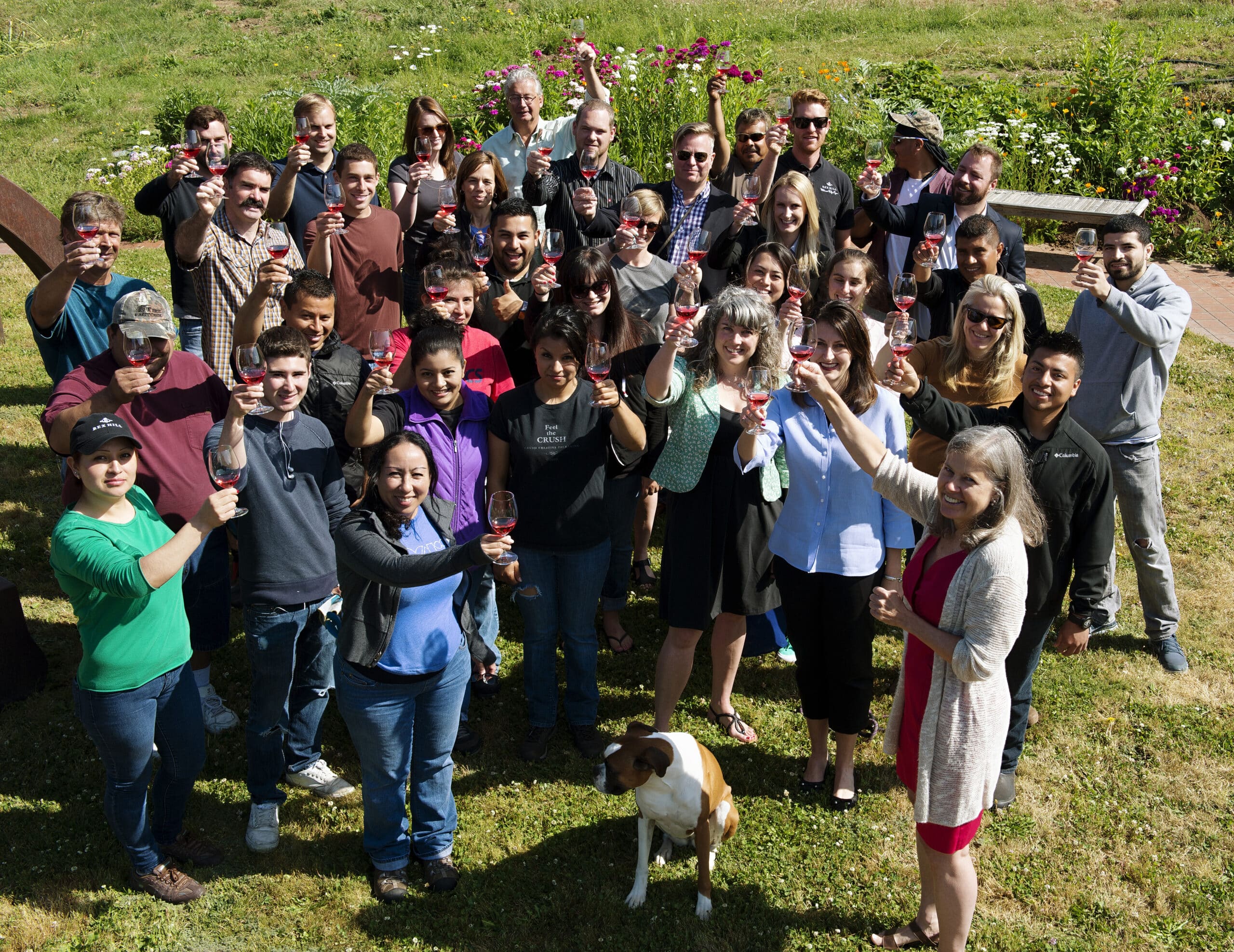
A to Z toast to becoming B Corp certified
What’s something about Oregon wine that few people know about?
Oregon has stricter labeling rules for what can be identified as Pinot Noir or Chardonnay than the federal laws followed by other states.
Outside of Oregon, Pinot Noir and Chardonnay can have 25% “other” wine and still be called Pinot Noir or Chardonnay.
Best meal you’ve ever had?
In France’s Champagne region, delicious Champagne is affordable with every meal because you’re in the heart of the district. I had many memorable meals there with my daughter.
Tell us one fact about the water footprint of wine and how that’s changing?
Making wine takes a lot of water for cleaning. Certifying agencies help make winemakers more aware of just how much water they’re using and of their wastewater systems. Third-party certifiers require you to measure what matters; you can’t kid yourself like you might if you’re not measuring.
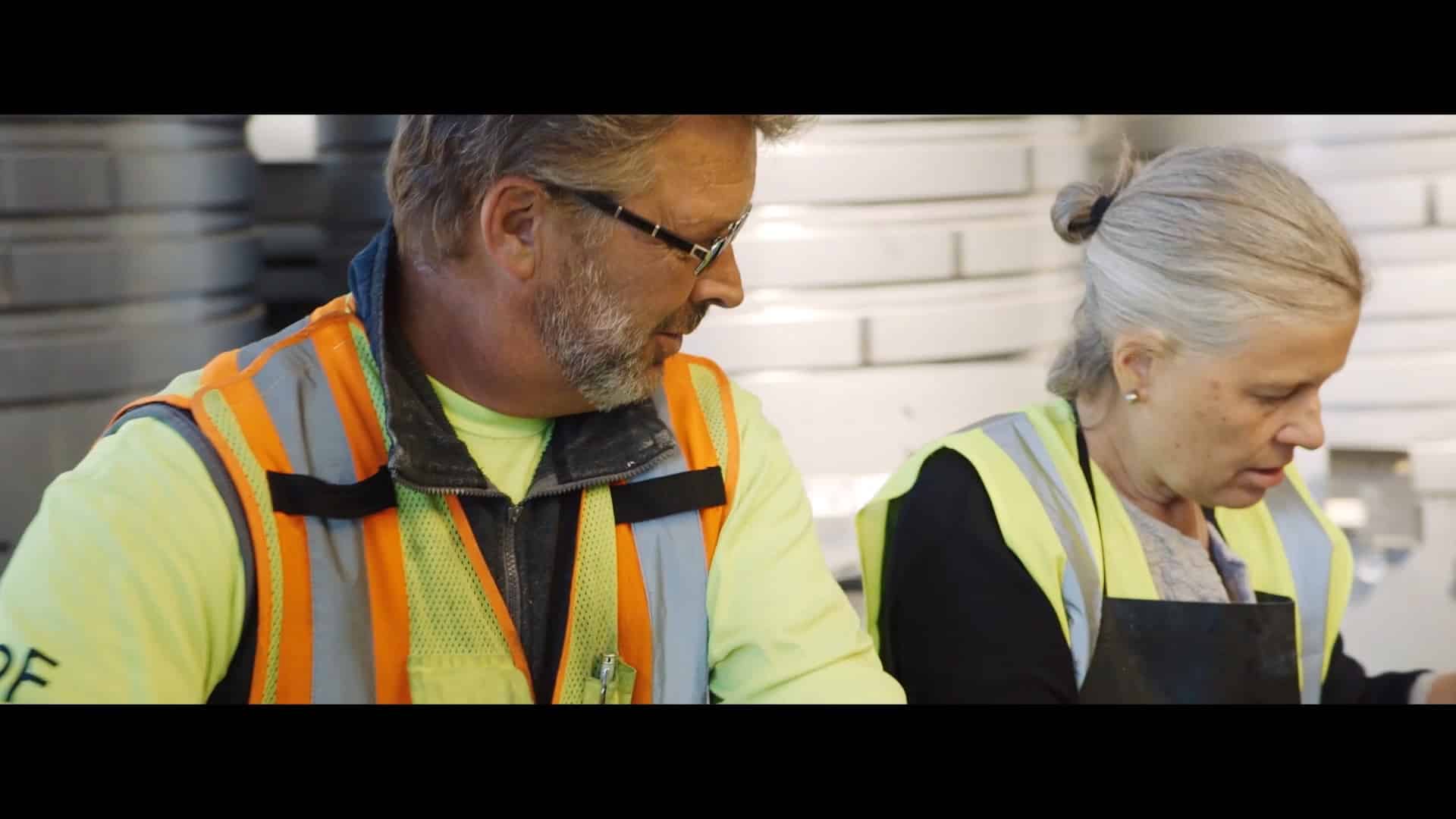
Deb working on the sorting line at the winery
What are some of the other environmental initiatives A to Z has taken up over the years?
We try to farm sustainably with intention using biodynamic principles and making our own biodynamic vineyard preparations. For instance, we pack cow manure into cow horns and bury them for half a year. When we dig them up, we make a tea out of the composted manure that we then spray in homeopathic doses in the vineyard.
It’s said that a farmer’s footsteps are the best fertilizer. If you have an intimate knowledge of your farm, and you’re engaged with it, you’ll know what it’s needing.
We try to apply biodynamic-like principles to our business as well as to our wine. Commerce and conscience go hand in hand. It’s like campfire rules: Always leave a place better than you found it. We try to practice that.
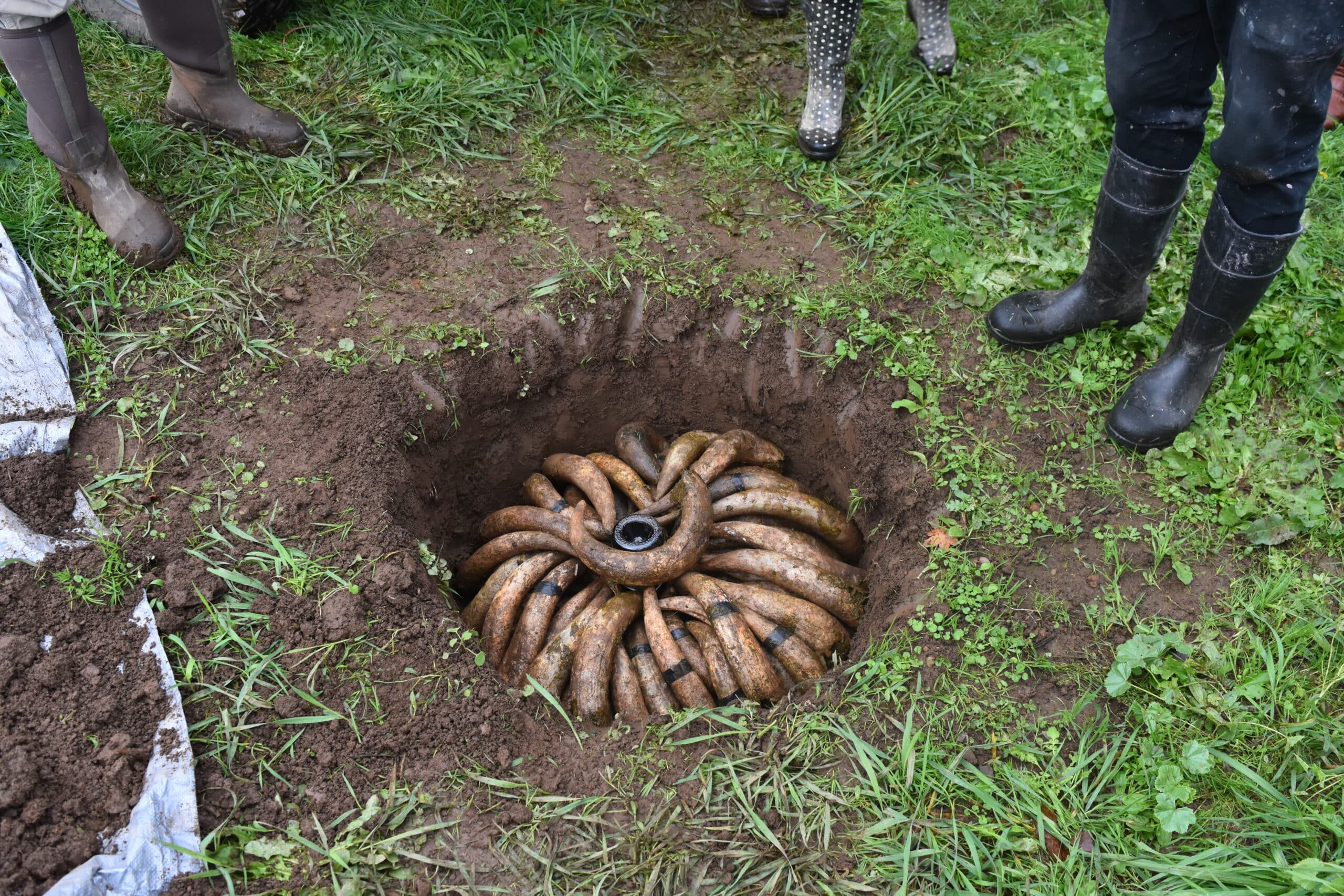
Cow horns packed with manure
What are some interesting wine traditions you’ve heard of throughout your career? Maybe historical?
I suppose we make our own. We mark equinoxes and solstices by tromping around the vineyard to observe and consider what is happening in the vines and the soil. Sometimes we write our intentions or what we would like to release on homemade paper and ‘plant’ them.
What do you want people to know about The Freshwater Trust?
The Freshwater Trust is using big data to precisely identify streamside sites where the greatest difference can be made through natural remedies. It’s meticulous, applied work with a long-term vision. And, oh my, they’re doing so much with not enough resources.
April 30, 2018#agriculture #board of directors #donor profile #donorprofile #donors #oregon wine #support #wine
Enjoying Streamside?
This is a space of insight and commentary on how people, business, data and technology shape and impact the world of water. Subscribe and stay up-to-date.
Subscribe- Year in Review: 2023 Highlights
By Ben Wyatt - Report: Leveraging Analytics & Funding for Restoration
By Joe Whitworth - Report: Transparency & Transformational Change
By Joe Whitworth - On-the-Ground Action – Made Possible By You
By Haley Walker - A Report Representing Momentum
By Joe Whitworth

